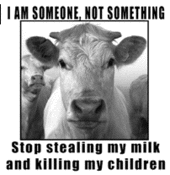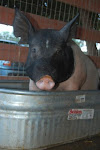If you want others to be happy, practice compassion. If you want to be happy, practice compassion. ~Dalai Lama
Besides the undeniable way in which Facebook helps organize our personal communities, it's also a great place to read comments from people who have volunteered their time and energy helping others.
Whether they've been volunteering at a sanctuary like Animal Acres or have been rescuing homeless animals, their enthusiastic posts sound like they're coming from people flying high on ecstasy at a rave or a love festival. This analogy isn't so far-fetched when you consider that the similarities in responses are not just a coincidence.
Over the past few years a number of researchers in the fields of cognitive science and psychology have shown that the love, compassion and kindness we express to others are much more conducive to our own mental well-being than we ever actually imagined. (Note: At the end of this post, I will provide links to these studies.)
The connection between being kind to others and the flourishing of happiness, whether that happiness is personal or on a global level, appears to be quite obvious.
(Since happiness is a rather vague word I will use it here in this post to mean the state of well-being)
There is a chain reaction when we are kind to others; the recipients of our kindness in turn feel better and thus act kinder to others, and so forth and so on. Kindness does appear to make life worth living.
One known fact in this chain that links us all is that each of us who is alive and conscious wants to be happy. Non humans as well as humans.
Every sentient being moves toward happiness and away from the absence of it. The basic principle that everyone longs for happiness and freedom from suffering is what causes us -- humans and non humans alike -- to feel compassion for one another.
Whether we're conscious of this principle or not, it's what helps make empathy possible.
Be kind, for everyone you meet is fighting a hard battle. ~Plato
Put another way, the individual and collective goodwill generated by humans and other animals who are treated with kindness and compassion, and who pass this feeling along, becomes the greatest source of happiness that exists.
Simplified still more: To treat others kindly is to act out of concern for their happiness yet it also proves to be a path to our own personal happiness as well.
Although this is a bare-bones explanation of altruism and its consequences, it tells us that there is a clear connection between being kind to others and feeling better about ourselves.
We simply need to honor the fact that including other beings in our wish for happiness is actually what makes us feel better and is what brings about concrete benefits to everyone.
There is a beautiful, truthful, unified irony here in our being compassionate activists. For what we soon discover is that we can all benefit not only from our own kindness to others but also from observing another's kind deeds done for others. You could say that we can all band together to "selfishly" help those who cannot defend themselves or speak out. By "selfishly," we can say that as activists we all benefit from giving, nearly as much as our intended beneficiaries do.
photo:Cameron O'steen
This is not about so called positive thinking. This is about putting the Golden Rule into action and about actually doing something. Positive thinking never found a home for a shelter animal or rescued a dog from a busy highway.
The benefits of committing acts of kindness are backed up by scientific evidence. Computer studies have analyzed data showing the reactions of good deed doers. There has even been exciting new research done that involves studying the brains of Buddhist contemplatives with fMRI machines. The monks have spent decades meditating on compassion or sympathetic joy. Over the years, these people have actually enlarged the areas of their brains that are responsible for feeling love.
Results of diverse studies have also proven that people who volunteer, people who perform acts of kindness, and people who focus on love and compassion (that is, meditate) have all shown marked improvement in their physical well-being.
In addition, the studies have shown that engaging in acts of kindness brings about feelings of euphoria and joy, followed by periods of calmness.
According to Allan Luks, the former executive director of the Institute For The Advancement of Health who conducted research in this area, "These feelings involve physical sensations that strongly indicate a sharp reduction in stress and the release of the bodies natural pain killers, the endorphins." This initial rush, he said, is then followed by a longer-lasting period of emotional well-being.
So from this information we can hypothesize that whatever a person's current level of happiness is, it will generally improve when they are kind or help others in need.
Volunteering to help care for animals at a sanctuary or shelter, for instance, not only contributes to the happiness of the animals but also causes feelings of fulfillment and accomplishment and a stronger sense of love and compassion toward one's self.
These states of mind not only feel good and affect us, but they also spread to those around us. Love and compassion are seriously contagious
Although it is true that cruelty, hate, jealousy, spite and shame are also contagious, they merely promote and spread the same negativity which created them. And, importantly,
they are never sources of happiness.
Like the Buddhists who focus their attention with laser-like intensity on love for all beings, we, too, can also practice becoming specifically aware of our compassion for animals.
photo:Cameron O'steen
There is something about being purposefully aware of what it feels like to be compassionate that brings us closer to recognizing our own kindness.
Any skill requires that we practice and refine our technique if we are to become accomplished. The same can be said about practicing kindness; we need to payclose attention to our mind when it fills up with the desire to be kind. The more we perceive and recognize this desire in ourselves, the more effortless it might be to live compassionately more frequently.
Now, as readers of this blog know, the definition of being kind to nonhumans includes not eating them and not being complicit with their exploitation and their deaths, even indirectly.
Living vegan expands our thinking to embrace others' wants and others' happiness. When we begin to move toward this attitude and away from always thinking about what seems best for ourselves (the "me first" mentality), we actually walk right into our own happiness, sometimes not even consciously aware.
As an ethical decision that is based on compassion and kindness for others, veganism, when done mindfully, becomes a rational way to strengthen and reinforce our own happiness.
The entire notion of living vegan and becoming a sanctuary for others is simply about understanding that what would benefit ourselves, we simply do for others as well.
Live vegan, be a sanctuary for others.
It's easy and it's a beautiful feeling.
“What wisdom can you find that is greater than kindness?”-Jean Jacques Rousseau
http://www.scientificamerican.com/article.cfm?id=meditate-on-this-you-can-learn-to-be-more-compassionate
http://www.mindandlife.org/collaboration.html
http://www.upaya.org/newsletter/view/2009/11/30#story6
http://www.crystalinks.com/medbrain.html
HELP US PLACE 114 GOATS WHO ARE NOW RESIDING AT OUR EVACUATION CENTER.
The animals rescued from a cruelty case in April are now healthy enough for adoption.
PLEASE POST ON YOUR FACEBOOK, BLOGS, AND OTHER SOCIAL NETWORKING VENUES THAT HOMES ARE URGENTLY NEEDED FOR OVER 100 RESCUED GOATS. WE NEED TO PLACE THESE ANIMALS TO ENSURE THERE IS SUFFICIENT ROOM AT OUR EVACUATION CENTER FOR THE SANCTUARY ANIMALS (IF WE NEED TO EVACUATE.

























